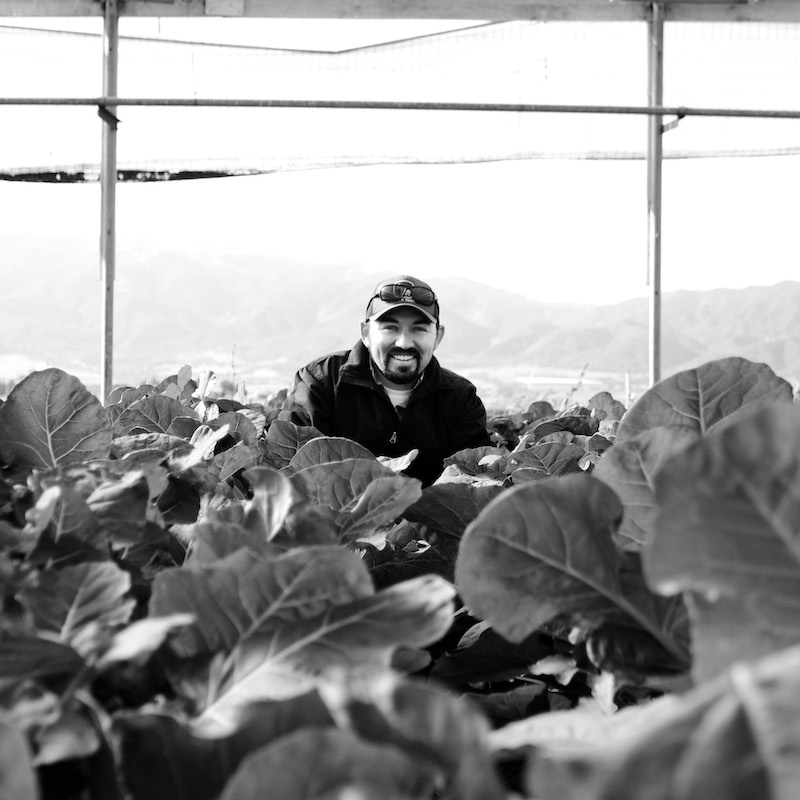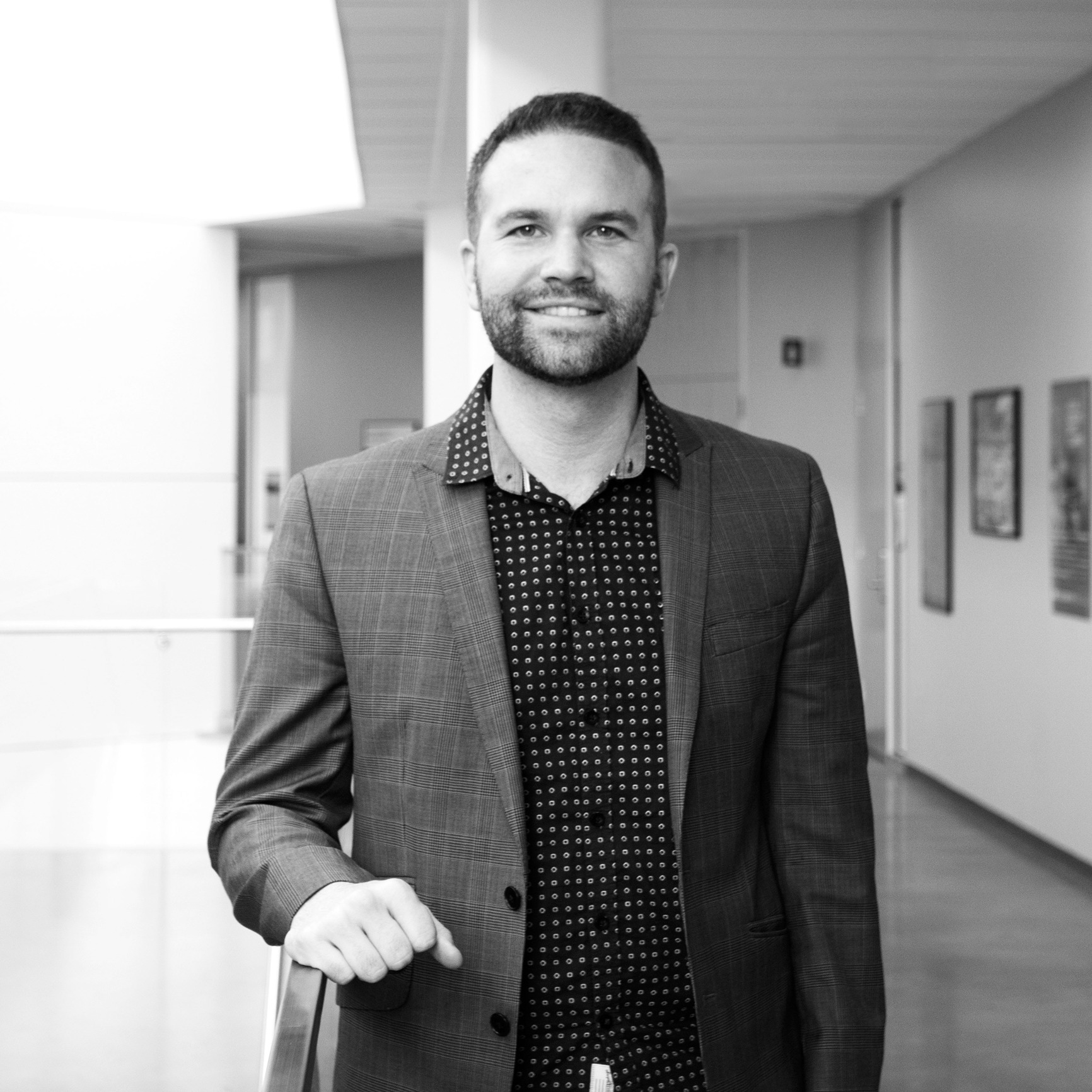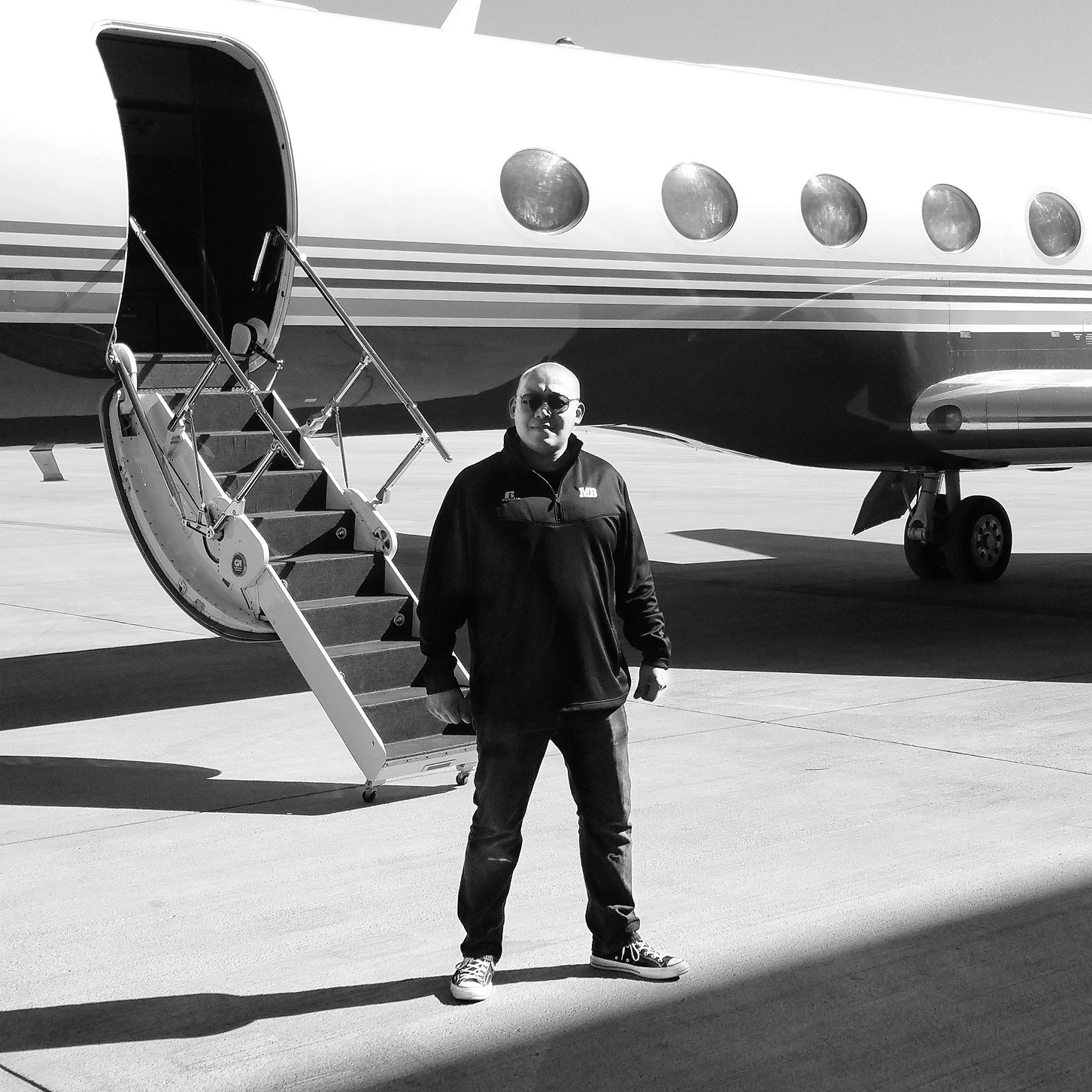CSUMB Magazine
Otters with Vision
Here are five Cal State Monterey Bay alumni entrepreneurs – Juan Perez, Mac Clemmens, Chelsea Bell, Vincent Suich and Rafael Zamora – who took valuable skill sets learned at CSUMB and charted their own course. The businesses are successful, each with a unique impact on their communities.
They are a small sample of successful Otter entrepreneurs. Many more are on their way.
Juan Perez (ESTP '09) - J&P Organics

Juan Perez enjoys the feel of soil and sun, working the land and seeing first-hand the literal fruits of one’s labor. He is the owner and operator of J&P Organics, a farm that grows a variety of produce without the use of pesticides or genetically engineered seeds. All of the weeding and picking is done by hand. The produce is sold directly to customers via home delivery. Running a farm is a great fit for Perez. He’s content.
It’s not something he was expecting.
Perez came to CSUMB after growing up working on a farm. As a child, Perez, a first-generation American, watched his father grow flowers and raspberries in Watsonville, often using chemicals and sprays in the process. His father offered him a job on the farm when Perez became an adult. He refused, deciding that livelihood wasn’t for him. Once at CSUMB, Perez explored liberal studies, business and computer science. Then came a physical science class. And a paid summer internship on an organic farm in Salinas, arranged by CSUMB Professor Bill Head. Perez learned about the effects of pesticides and chemicals that were commonly sprayed on produce. He learned the benefits of organic growing and harvesting. That was it. He had found his calling.
“I went to CSUMB to get a better job and came back to what I love … farming,” Perez said.
Perez founded J&P Organics with his family in 2006. The business is truly a family affair. His father and brother manage the day-to-day operations. His sister manages the bookkeeping and accounting. They started with one acre. J&P Organics now has 10 acres, and grows a variety of produce, including strawberries, lettuce, potatoes, zucchini, squash and onions.

“I love everything about it. It’s been tremendous,” Perez said. “We grow, pack and deliver it. No stores at all. Our produce goes directly to our customers.”
J&P Organics distributes their produce through a “farm box,” a package ordered by customers online allowing them to pick their delivery based on what’s available and in season. After customizing their order, customers can decide if they want weekly, bi-weekly or monthly deliveries. No commitment is required.
Business is booming – but Perez would like to come back to CSUMB at some point and pursue a master’s degree. He credits Bill Head, now retired, for opening the door and allowing him to do what he loves. “Before Bill Head got me that internship on the organic farm, I didn’t know what I wanted to do, I didn’t have a lot of direction,” said Perez. “That opportunity brought me to this. Thanks to what I learned in the College of Science, I can farm in a healthier and more efficient way. I use that knowledge every day.”
Mac Clemmens (TMAC '05) - Digital Deployment

If you need to pay your way through school, start a business.
Mac Clemmens founded Digital Deployment, a web development company, “out of necessity”in the summer of 2004 between his junior and senior years at CSUMB. Revenue from the start-up covered the bills and made Clemmens realize that building websites was great business. His Capstone was building a website for the Otter Realm.
After CSUMB, Clemmens moved on to UC Davis to earn an MBA – with Digital Deployment covering most of the tuition. After his master’s degree, things got much easier, since he could focus on the company full time. The first year after grad school, Digital Deployment did approximately $200,000 in billed projects. Now it’s in the millions.
The company employs nearly 20 people with a client list that includes United Way, Stanford Youth Solutions and CalSTRS. Beautiful websites have been built for clients – and these sites can be easily modified and updated by a non-technical user. Digital Deployment uses a single model in web content management, which accelerates development because the software is standard. This approach differentiates the company from competitors –but it’s not the only one. The company culture is unique.
“It’s very satisfying to own your own business, hard, but satisfying,” Clemmens said. “At the end of the day, you can do things differently, especially with employees. We have unlimited vacation. We have a food program that provides healthy meals twice a week, along with veggie bags and smoothies. I work with great people and enjoy honoring the contributions of others.” The company has been named the#1 Best Place to Work by the Sacramento Business Journal.

Clemmens is involved in a variety of political and social causes. He works with the American Sustainable Business Council on issues that include reducing student debt by subsiding STEM majors, fair wage, clean water and electric/alternative energy.
Another issue is fair taxation on small businesses. Clemmens was recently singled out by Hillary Clinton in a speech after acknowledging Clemmens’ point that Apple pays an 8 percent effective tax rate, yet businesses like Digital Deployment pay a 24 percent effective tax rate. “Why should Digital Deployment, a small business, have to pay three times more tax on profit than Apple?” asked Clemmens. “Small businesses are such an important part of the American economy.”
Many critical skills for running a small business were acquired at CSUMB, according to Clemmens. He calls the TMAC (Telecommunications, Multimedia and Applied Computing) program “fantastic,” stating it was one of the only programs to combine design and technology. Bobbi Long and Barbara Sayad were tremendous influences. “I learned not only technology skills – but skills in dealing with and managing people,” Clemmens said.
Chelsea Bell (ISSM '07) - Stone Fox Swim

A love for the ocean and lush, tropical destinations is what inspires Chelsea Bell, the owner and chief designer of Stone Fox Swim. The company conceptualizes, manufactures and markets a custom swimsuit/active apparel line that features vibrant floral and tropical prints, perfect for those traveling to exotic locales and immersing themselves in beach culture.
A Pacifica native, Bell brought her passion for beach culture and the ocean to CSUMB. As a student, she was a member of the sailing team and taught surfing for the university during the summers. Her Capstone project was starting up a surfing shop/surfing school. Bell credits Professor Barbara Mossberg as a huge influence in shaping her career.
“If it wasn’t for Professor Mossberg and the Integrated Studies program, I may not have been put on the path to fulfill my passion, or had the tools to really thrive at it. I feel like her program was a ‘how to’ into being an entrepreneur,” Bell said.
“The basis of the major was being accountable to yourself and your goals. If you didn’t do the work, build the curriculum and hold yourself to it, who would? That’s the life of a business owner in a nutshell.”
Following her graduation from CSUMB, Bell founded Stone Fox Swim. One of the main inspirations for starting the company was a month long adventure in French Polynesia.

“I began to travel and explore more tropical places and that’s where my love for swimwear got taken to another level,” Bell said. “I thought to myself, why not make my own, exactly what I like and the way I like it? The rest is history.”
Bell focuses on the graphics and prints of each year’s swimsuit and active wear collections. Her creative process has become more streamlined over the years. It starts with concept drawings. Final patterns are then produced. Bell develops what she calls a “storyline” for each collection, which influences the color she chooses. Then photo shoots and finally, the selling season for each collection. This is repeated several times a year. Bell wouldn’t have it any other way.
“The best part of owning a business? One word: freedom,” said Bell. “My time at CSUMB played a major role in where I’m at today – great memories with amazing people.”
Vincent Suich (MIE '01) - The Sox Box

Never judge a person until you walk a mile in their shoes, as the saying goes. Many veterans are still fighting a war that many of us will never understand. They have set foot in horrific places, physically and mentally, to serve our country. Vincent and Athena Suich know this.
But almost anyone wearing shoes needs a pair of socks to cushion the impact – and those socks can make a statement as the mind and body are strengthened, and in many cases for veterans, are repaired. Some statements can be inspirational. Others are humorous. That is the philosophy behind The Sox Box.
Passionate about fitness, Athena noticed athletic socks being worn in the gyms and locker rooms they frequented. She saw the designs and thought it was a good idea to add color and eye-catching messages. The Sox Box was founded with seven different styles and messages. It now has over 100 designs of socks and over three dozen shirt designs.
Vincent embraced his wife’s initial idea and took it a step further – their business would donate 20 percent of all profits to help veterans and designated social causes.
“Training with U.S. Air Force Pararescue changed my perspective on life and service before self. It’s a brotherhood,” Suich said. “What makes the business personal for me is that I can give back to my guys. After 13 years in the military, I wanted them to know they weren’t forgotten or pushed under the rug. Many come back and have serious mental and physical issues that require attention.
“This model of giving back to veterans is important to me – and what sets our business apart. I hope that model catches on with other businesses. We are saving a lot more soldiers with combat injuries and that is good….but these people are afflicted for the rest of their lives. There are not enough resources to handle them. The burden is on the civilian sector, we need to pull our veterans back in and help them heal.”

Social media is a primary way The Sox Box connects with its customers. The company’s Facebook account has over 220,000 likes and counting. The Instagram account has more than 34,000 followers. It’s an excellent source of future messages for their socks, with customers regularly submitting their own ideas. All of the socks are made in the U.S. and distributed through a warehouse facility in Colorado. As a company committed to doing good for society, The Sox Box is also distinguished as the only certified B Corporation in Monterey County.
Suich served in the reserves while attending CSUMB. Athena attended Monterey Peninsula College and went to the Fire Academy. Both have put their hearts into the business. Suich credits John Kim, CSUMB professor of international business, as a very strong influence.
“It can be tough but personally, it’s touching how our ideas can be put into a product and it affects somebody’s life,” he said. “We enjoy having an idea and running with it.”
Rafael Zamora (MIE '96) - Totali Action Sports

Hurtling down a mountain road on a customized skateboard, navigating turns with the scenery rushing by, doesn’t sound like an ideal afternoon to most people. To Rafael Zamora, it’s heaven.
An extreme sports enthusiast, Zamora envisioned Totali Action Sports as a CSUMB student, when he was scuba diving in the mornings before heading to class. The expanse of surrounding Fort Ord sparked his curiosity with what Zamora calls “transportation mobility with efficiency.” He was introduced to the concepts of ecology, sustainability and commerce. It went from there.
“At that time, it never dawned on me how such foreign topics that I once thought were anecdotal, would become the foundations of my business,” he said.
One flagship product that supports these principles is the TSB-Freedom Electric V1.5, a battery-powered electric “platform” that can reach speeds of 30 mph. Resembling a large skateboard, the Freedom Electric is controlled by a wireless hand-held device that allows the rider to accelerate, stop and enable a cruise control. The battery pack has an 18-mile range. According to the company, on average the Freedom Electric uses 22 times less energy for every mile compared to a gasoline-powered car. It reduces the carbon footprint significantly, especially for short distances.
Other products are in development that also will allow innovative and personal modes of transportation. The company’s apparel line has gotten increasingly popular with its customers, another aspect that differentiates Totali from competitors.

“Our target demographic are college-educated, working professionals who maintain an active lifestyle, but who no longer align themselves with the skateboard/surfboard and T-shirt brands,” Zamora said. “We cater to a mature buying audience that can make their own purchase decisions. Not the pre-teen, teen and early 20s market.”
Zamora loves owning a business in the action sports industry. One of the best things about it is the creative aspect, and working with a staff that compliments and challenges, according to Zamora. Another highlight is the like-minded entrepreneurs that he has met along the way. It’s a community.
That’s not the only community he feels a part of. “Out of my time at CSUMB, the strongest influence on me were the friendships I made there,” Zamora said. “Those friendships are stronger today. We have kept in touch through the years and have grown up together. It’s an alumni family now, with friends thousands of miles away.”